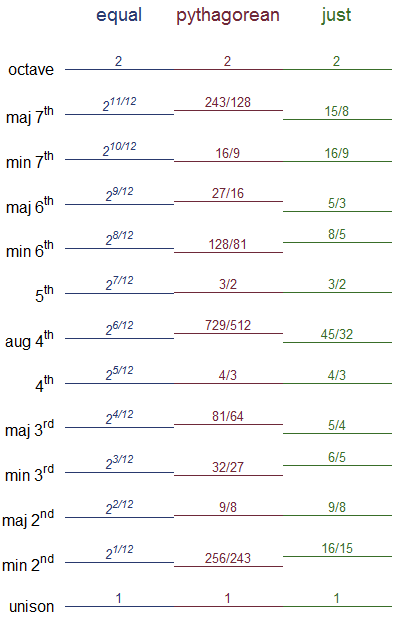Intonation Systems
An intonation system determines the relative pitch or interval of each note. The musical interval of two notes can be computed as the ratio of their frequencies. Intervals that can be written as a fraction of small integers sound consonant or pleasing to the ear. They are called “just” or “perfect” intervals. For example, octaves and fifths have ratios of 2/1 and 3/2. Some intonation systems temper these intervals slightly to achieve other purposes.
Just Intonation is composed entirely of just intervals relative to the root note. The downside is that the absolute pitch of notes can change depending on the root note or key signature. That means an instrument like the piano tuned to just intonation could not change keys without re-tuning.
Pythagorean Intonation is built on the ratio of 3/2. It has some just intervals and some dissonant ones. In both the major and natural minor scales, all whole steps and half steps have the same intervals (9/8 and 256/243), which makes it attractive to string players. As with just intonation, the absolute pitches depend on the key signature.
Equal Temperament evenly divides the octave into 12 notes so the each half-step has the same interval. This allows spontaneous key changes, but the intervals are only approximate.
Comparison

Which Should I Use
If you’re not sure what key you are playing in, then equal temperament is the safe choice. Equal temperament may also be useful if you want to match a piano. For scales and songs that stay in one key, pythagorean intonation makes sense. Just intonation is useful for arpeggios, broken chords, and sometimes a part that harmonizes with another.
Regardless of the tuning system, the “just interval” window is recommended when tuning double stops. Note that it may be impossible for the double stop interval and both individual notes to all fit a particular tuning system.